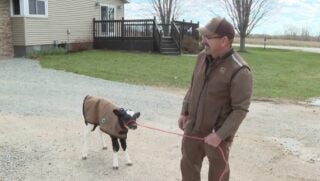Drones have long since been used in the military and were made popular in the classic “Star Wars” film series. These technologies that were once seen as a sci-fi tool of tomorrow could now be the answer of today when it comes to efficient agricultural practices.
One way leaders in Florida’s agriculture industry are staying ahead of the curve is by giving high school agriscience students the opportunity to gain hands-on experience with drone technology.
Last year, 12 high school agricultural education programs participated in a pilot curriculum that allowed students to learn about the application of drones in the ag industry. Twelve additional schools will be participating this year.
“The thing that really caught my attention with this program and curriculum is that it is an ever-evolving addition to the agriculture industry in general,” South Sumter High School agriscience teacher Tim Edwards said. “I realized that the students we are training were the ones that would develop uses for all facets of the agriculture industry.”
Seventeen students at South Sumter High School participated in the pilot program last year, and 20 students are enrolled this year.
Through participation in the program, students have the opportunity to become safety certified with the Federal Aviation Administration and give them a leg up to pursue further certification for drone operation, which will allow students to be more competitive in precision agricultural fields upon graduation.
“Exposing these students to this technology and then applying it to a real purpose for the agriculture industry early on will give them a competitive advantage in acquiring a job because they will know how this technology works,” Edwards said.
Edwards says students are interested in the capabilities of drones and how these technologies can be applied to agriculture.
“Students are amazed at the types of problems or issues with crops, animals, and irrigation that can be identified by a camera on a drone,” Edwards said.
Florida Farm Bureau and Florida’s Department of Education partnered together to bring the program to fruition.
“We hope this program shows students a new side of the agriculture industry,” Florida Farm Bureau agricultural policy director Frankie Hall said.
According to Hall, drones are an inevitable tool when it comes to the future of farming that will allow farmers and ranchers to reap rewards.
“Drones are another precision agriculture tool that can help lower farmers’ input costs,” Hall said. “This is the way of the future!”
While teaching students about drones, Edwards learned just how complex these futuristic tools can be.
“I have spent hours reading in order to answer the technical questions students may have,” Edwards said.
In order to learn more about the technology, Edwards has also met with experts in the field of precision agriculture, including the men and women who work at Highland Precision Ag.
“For the student that is research-minded, I believe that drones are an excellent way to gather data on test plots,” Highland Precision Ag client support agent Kaylee Norris said.
Highland Precision Ag is a Florida-based company that is committed to empowering farmers and ranchers with precision agriculture tools that will allow them to produce most efficiently.
One of the most valuable aspects of this program is that students learn more than technology- students learn about production agriculture and how precision technology can benefit the agricultural industry.
“I think we need to stress the importance of getting an education in agriculture rather than just the drone operation education,” Highland Precision Ag Director of Multimedia Suzie Freedland said.
Freedland and Norris have both already seen a fluctuation in the use of drones and suggest that students become knowledgeable in a variety of forms of precision technology in order to stay with the trends of the industry.
“I think agricultural technology courses can be very beneficial for students, but should be focused on all aspects of the agricultural technology world such as variable rate sprayers and soil sensors rather than just UAVs,” Norris said.


